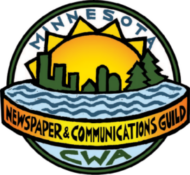We have been performing this assignment for more than 90 years. The Twin Cities Local was the second to receive a Guild charter and was organized in 1933 with the assistance of Heywood Broun, the man credited with creating The Newspaper Guild. Today the Twin Cities chapter carries the designation “Local 2” as an indicator of its early organization.
According to one account, the Twin Cities Local was born a few months after the publisher of the Minneapolis Tribune told his white collar employees one day in 1933 that he was cutting their pay by 10 percent.
The publisher, Frederick E. Murphy, explained that he was forced to reduce advertising rates because of economic conditions, but the only salaries he could cut were those of non-union employees. The wages of printers, pressmen, engravers and stereotypers were protected by contracts, he said.
Although The Newspaper Guild began as an editorial-only union, Broun soon took the lead in seeking to open the Guild to other newspaper employees. Commercial employees now are estimated to make up approximately half the Guild’s membership.
In the Twin Cities, the Local represented advertising salespeople, circulation department employees, clerks, janitors and messengers, as well as reporters, editors, artists and photographers. There have been some changes in the past few years. First of all, The Newspaper Guild merged with the Communications Workers of America in September of 1995 and became a sector of this large union of over 600,000 members. Also, on January 1, 2000, the Local merged with the Minneapolis-St. Paul Typographical Union, Local 30 which represented over 150 typographers in several shops throughout the Twin Cities.
The union exists for one reason: power. We’ve achieved it through the work and dedication of Twin Cities Guild members over the past six decades. With the addition of the Typo Union 30, the first craft union organized in the state (in 1850), we have increased that power.
Today, you can continue to make your newspaper or shop a better place to work through your involvement in the union.
